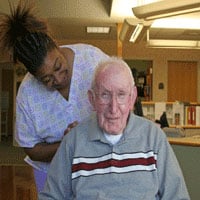
Nursing homes across the United States provide care to residents with every type of medical condition whose ability to care for themselves is limited. The CDC reported that more than nine million people received care in a nursing home facility in 2014. A significant proportion of the residents have diagnoses of dementia or related cognitive impairments. For nursing home workers, sexual harassment and inappropriate contact by patients can be a daily occurrence. Yet, every worker has the right to a safe and secure workplace free of sexual harassment and assault.
Nursing home workers range from aides to activity assistants to registered nurses and social workers. For patients with dementia, the part of the brain which typically limits overt sexual behavior is damaged and thus these inappropriate behaviors can be directed at the female caregivers. Nursing home workers across all occupations have reported patient behaviors ranging from inappropriate sexual comments to physical and sexual assault.
Medical Conditions Trigger Behaviors
The nursing home industry has the responsibility to properly train staff to recognize when patient behaviors require intervention, and that includes sexual harassment. Nursing aides, according to the CDC report, comprise more than 63 percent of all nursing home staff, and are the front-line workers who dress and bathe patients under their care; these are one-on-one patient settings that place them more at risk. Nursing aides also typically have less nursing training and are less familiar with how to address the situation, as well as the medical conditions that cause the behavior. Medical assessments of each patient should be a prime part of any intervention to determine if the behavior can be managed medically.
Facilities have the responsibility as medical providers and employers to mitigate situations where caregivers are subjected to inappropriate advances or harassment. Caregivers who are experiencing harassment in the workplace are not only being victimized but are more likely to leave employment. Thus, the nursing home industry has a significant economic and ethical stake in addressing the problem. Sexual harassment on the job, whether from a colleague or a patient, is traumatic and has significant emotional and psychological effects. For anyone who has been the victim of inappropriate advances in the workplace, the guidance of an experienced sexual harassment lawyer can help you understand your rights and legal options.
Philadelphia Sexual Harassment Lawyers at The Gold Law Firm P.C. Advocate for Victims Suffering from Sexual Harassment in the Workplace
If you or someone you know experienced sexual harassment at work, the Philadelphia sexual harassment lawyers at The Gold Law Firm P.C. can help. Contact us for a free consultation via our online form or call us at 215-569-1999 today. Located in Philadelphia, we represent clients in Bucks County, Chester County, Delaware County, Montgomery County, and throughout New Jersey.



































